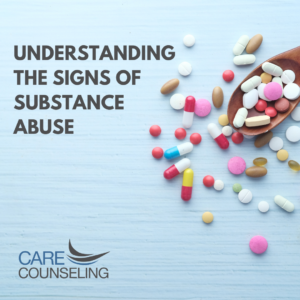Understanding the Signs of Substance Abuse
 Substance abuse is a complex issue that affects individuals, families, and communities worldwide. Recognizing the signs of substance abuse is crucial for early intervention and support. In this blog, we will explore the signs and symptoms of substance abuse, shedding light on this important topic and providing guidance on how to help those who may be struggling.
Substance abuse is a complex issue that affects individuals, families, and communities worldwide. Recognizing the signs of substance abuse is crucial for early intervention and support. In this blog, we will explore the signs and symptoms of substance abuse, shedding light on this important topic and providing guidance on how to help those who may be struggling.
What is Substance Abuse?
Before delving into the signs, it’s essential to understand what substance abuse entails. Substance abuse refers to the harmful or hazardous use of psychoactive substances, including alcohol and illicit drugs. It encompasses behaviors that lead to physical, mental, and social harm. Identifying the signs of substance abuse can be a life-changing step in addressing this issue.
Physical Signs of Substance Abuse
- Changes in Appearance:
One of the early signs of substance abuse can be visible changes in a person’s appearance. These changes may include a decline in personal hygiene, neglecting grooming routines, and a disheveled appearance.
- Bloodshot Eyes:
Bloodshot or glazed eyes can be indicative of substance abuse, particularly if this symptom is persistent.
- Unexplained Weight Loss or Gain:
Dramatic changes in weight, without a medical explanation, can signal substance abuse. This can result from appetite changes associated with drug use.
- Sleep Disturbances:
Individuals struggling with substance abuse often experience sleep disturbances, such as insomnia or excessive sleepiness.
Behavioral Signs of Substance Abuse
- Secretive Behavior:
Those engaging in substance abuse may become increasingly secretive about their activities and whereabouts.
- Isolation:
Social withdrawal and isolation from friends and family are common signs. Individuals may start avoiding social gatherings or lose interest in activities they previously enjoyed.
- Financial Issues:
Substance abuse can lead to financial problems, such as borrowing money frequently, stealing, or experiencing sudden financial hardship.
- Lack of Responsibility:
Neglecting responsibilities at work, school, or home, such as missing deadlines or appointments, is a significant behavioral red flag.
- Engaging in Risky Behavior:
Substance abuse often leads to risky behaviors like driving under the influence, unprotected sex, or illegal activities to obtain drugs or alcohol.
Psychological Signs of Substance Abuse
- Mood Swings:
Frequent and extreme mood swings, including irritability, aggression, or sudden euphoria, can be associated with substance abuse.
- Poor Concentration:
Difficulty focusing, forgetfulness, and decreased cognitive abilities are common cognitive symptoms.
- Increased Anxiety or Depression: Substance abuse can exacerbate symptoms of anxiety and depression, making these conditions more challenging to manage.
- Paranoia or Hallucinations:
In some cases, substance abuse can lead to paranoia, delusions, or hallucinations.
Changes in Social Relationships
- Conflict with Loved Ones:
Individuals with substance abuse issues may experience increased conflicts with family members, friends, and romantic partners.
- Loss of Trust:
The trust between the individual and their loved ones can erode as a result of deceit, lies, or broken promises.
- Social Isolation:
As substance abuse progresses, individuals may isolate themselves further from their support networks, compounding their problems.
Physical Health Issues
- Frequent Illnesses:
Substance abuse can weaken the immune system, making individuals more susceptible to illnesses.
- Neglected Health:
Individuals with substance abuse problems may neglect their health, such as missing medical appointments or not managing chronic conditions properly.
Financial and Legal Problems
- Legal Troubles: Involvement in legal issues, such as DUI arrests or possession charges, can be a clear indicator of substance abuse.
- Financial Instability:
Frequent financial difficulties, including unpaid bills, accumulating debt, or selling personal belongings to sustain substance use, can point to a problem.
Neglecting Responsibilities
- Work or School Issues:
Decline in work or academic performance, frequent absences, or job loss can result from substance abuse.
- Parenting Neglect:
Individuals with substance abuse issues may neglect their parenting responsibilities, potentially leading to child neglect or custody issues.
How to Help
If you suspect that someone you know is struggling with substance abuse, it’s essential to approach the situation with empathy and care. Here are some steps to consider:
- Express Concern:
Have an open and non-judgmental conversation expressing your concern for their well-being.
- Offer Support:
Let them know that you are there to support them in seeking help and making positive changes.
- Research Treatment Options:
Familiarize yourself with local treatment options, such as counseling, therapy, or support groups.
- Set Boundaries:
Establish healthy boundaries to protect your own well-being while providing support.
- Seek Professional Help:
Encourage the individual to seek professional help from a therapist, counselor, or addiction specialist.
- Avoid Enabling:
Be mindful not to enable their substance use or behavior.
- Stay Informed:
Learn more about substance abuse and addiction to better understand the challenges they are facing.
Recognizing the signs of substance abuse is a critical step in helping individuals seek the support and treatment they need. Substance abuse is a complex issue with both physical and psychological effects, and early intervention is key to recovery. By understanding the signs and offering support and resources, we can contribute to breaking the cycle of substance abuse and promoting better mental and emotional well-being.



























